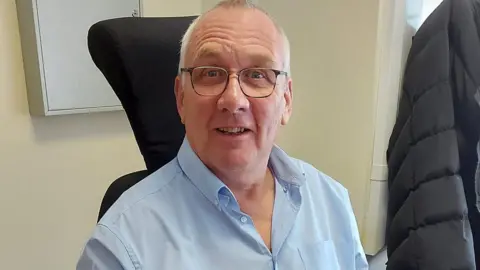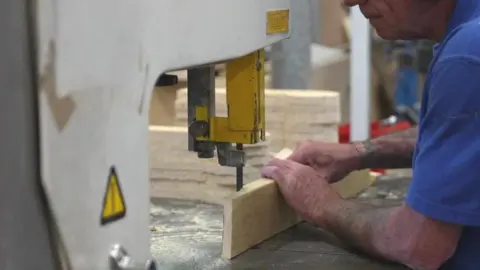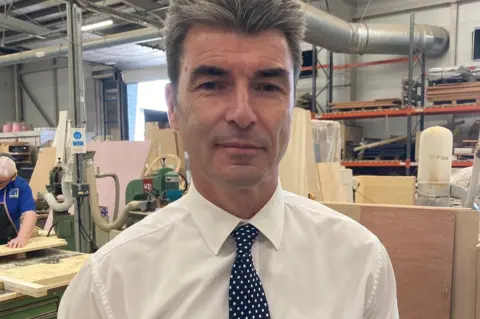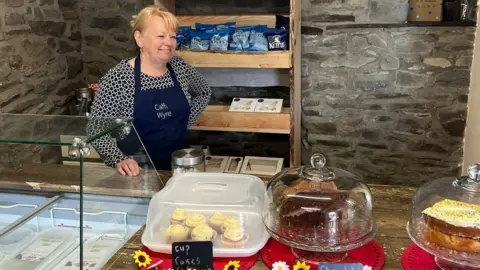Charity funding limbo prompts fears for vulnerable people
 BBC
BBCWhen 66-year-old Geoffrey Thomas suffered a stroke five years ago, he thought he would never work again.
Until a scheme run by a local charity helped him into a job.
"Now I've got pride back as well" said Geoff, from Bedlinog near Merthyr Tydfil.
But an umbrella body for charities says projects supporting some of Wales' most vulnerable people are under threat because UK ministers have been too slow to set up a new funding scheme.
The UK government says councils now have "direct control" over how money for such schemes, which used to be funded by the European Union, is spent.
The Welsh Local Government Association (WLGA), which represents local authorities, said councils were coming up with plans for how charities will apply for funding.
But this process will take months, by which time many projects will have to shut down, according to the Wales Council for Voluntary Action (WCVA), a membership body for voluntary organisations.
The WCVA said it had helped more than 22,000 people like Geoff get into work through schemes across Wales.
Since 2015, it has handed out £48m in European money via its Active Inclusion Fund - helping get people who are furthest away from the labour market into work.
But the WCVA said charities across Wales were being left in limbo, with most projects ending in September.
It said "life-changing" schemes may have to stop temporarily, or in some cases permanently, because of delays in replacing European funds after Brexit.

"I've come along great and now my self-esteem and confidence is way up again," said Geoff, who now works at the Merthyr Tydfil Institute for the Blind (MTIB).
"Any delay in renewing projects would be a travesty, I think."
In October 2020, a committee of MPs criticised the "unacceptable" delays in providing details of how the UK government's new Shared Prosperity Fund (SPF) would work.
Last month, UK ministers announced some details on the SPF, claiming it would "slash bureaucracy and give control to locally elected leaders" in Wales in deciding how to spend almost £600m over the next three years.
But the Welsh government said the SPF would mean Wales being "more than £1bn worse off from EU funds not being replaced in full". The EU fund averaged £375m a year for Wales.
Redundancy warning
Matthew Brown, from the WCVA, said the SPF was not yet in a position to allocate money to charities, meaning some of Wales' most vulnerable people would lose out.
"We've got organisations telling us they've got huge amounts of demand coming from their communities and a really important source of funding is about to end," said Mr Brown.
"So how are they going to be able to meet that demand of those really vulnerable people in their communities if we've got European Funding ending, and the new UK government funds not starting up in time?
"During a cost of living crisis it's really important that we can support those people."
The WCVA said many voluntary organisations would have to make staff redundant because of the uncertainties.
"That means people aren't being supported, those people then are not getting the visits, the added skills and education that they may well need. It's then going to disappear," he added.

Geoff's colleague, Peter East has disabilities too, suffering with back problems and arthritis in his shoulder and neck. He now makes furniture at MTIB.
"I don't think I'd be in work at all [without the project] to be honest with you," said 63-year-old former bus driver, Peter.
"It's nice to be working with people and meeting people every day. It does make a difference to your mental health."
'Downsize would be tragic'
Their boss, Richard Welfoot, said they are vital to the success of the company and he fears for the organisation's future.
"By now we would've had probably one or two other programmes that we would've secured", Mr Welfoot said.
"What we don't have is a plan of where that next tranche of funding for projects [will come from] going forward, and if that doesn't come forward quick enough then we could lose all the skills that we've got.
"We wouldn't want to lose staff but if it goes on too long and we can't fund that gap then we will be in a problem situation.
"If we had to downsize it would be tragic for us... especially as next year we're meant to be celebrating our 100th anniversary."
Terris Bird, 63, has been working at Caffi Wyre in Llanrhystud, Ceredigion, since the start of the year, making cakes and serving customers.

The Active Inclusion project provided vital training and supports her wage.
Asked where she thinks she would be without the project, she said "stuck at home I think and not seeing anybody".
"Having the job is very good for me personally," Ms Bird said.
The cafe's owner, Anwen Rosser McConnochie, said she had relied on the project to hire Ms Bird and another member of staff, helping her keep her business afloat.
"The importance of the project has just been vital to be honest. If it wasn't for the project I doubt we'd be here now. It's just such a shame that this funding is coming to an end."
What does the UK government suggest?
The UK government said local councils could fund projects in advance of the SPF mechanisms being finalised, but they would risk being left footing the bill if it is subsequently decided that the protects are not eligible for SPF support.
The WLGA said: "Local authorities are very aware of the issues facing the voluntary sector organisations and will be working with them over the coming weeks to look at projects that align with their emerging investment plans and, where that is the case, to look at how those initiatives can be supported to ensure continuity and avoid losing good staff and quality services to communities."
